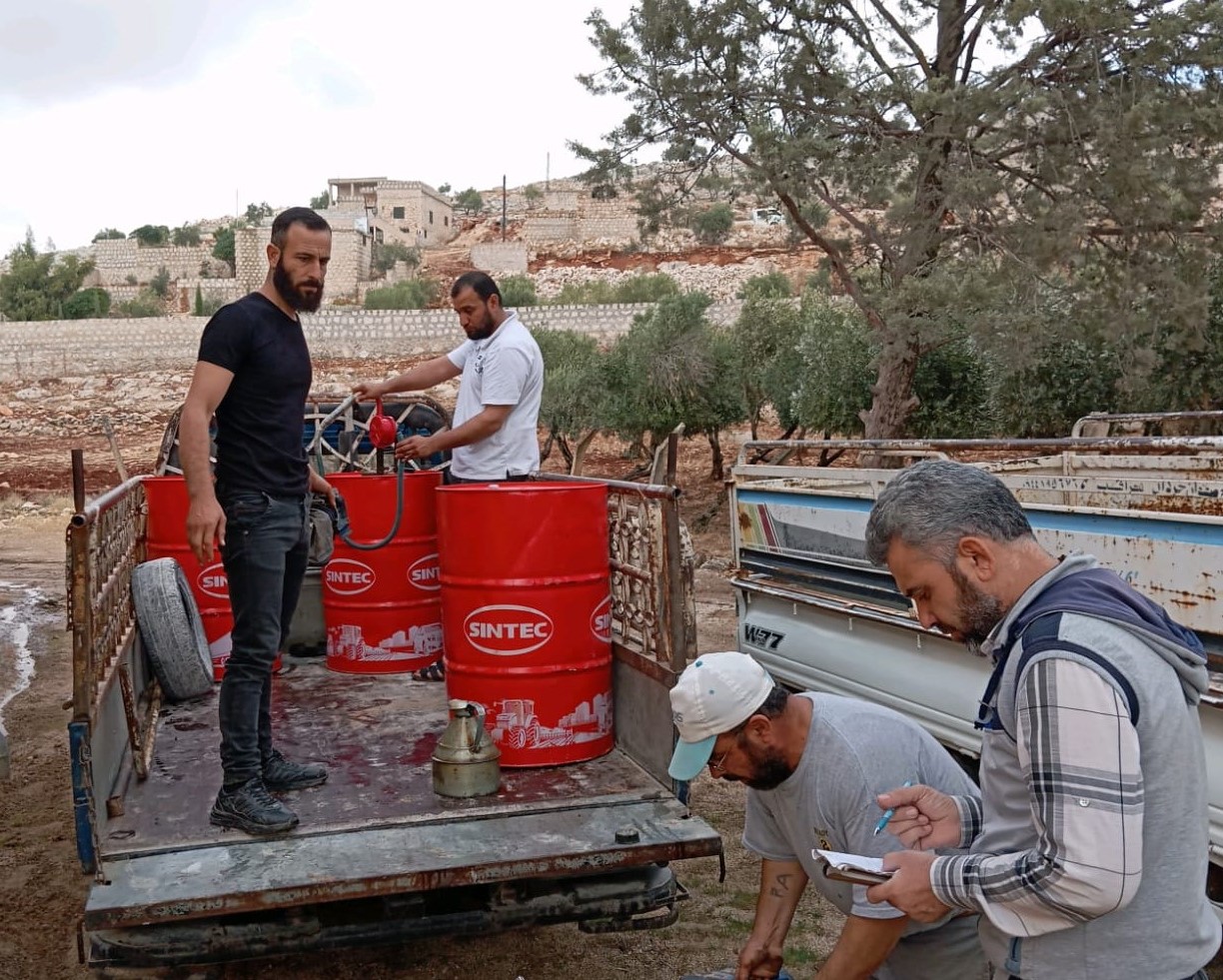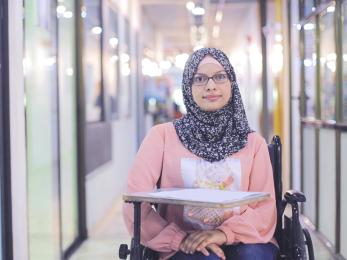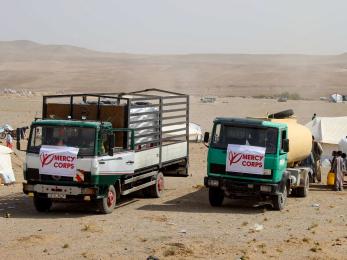The young refugees stuck in Greece
For thousands of young refugees, the road to Europe ended on the islands of Greece. They came from countries like Syria, Afghanistan and Somalia, all from different circumstances but with the same shared dream: to leave behind the violence of home and build a better life on safer shores.
But after walking across international borders, being smuggled inside trucks, and finally securing passage across the open sea, many of these young men and women stepped onto the shore to learn the doors into Europe had been closed.
Now they wait, stateless and jobless, marking their days in refugee camps while they nurture the same simple dream that brought them there — to build a safe, stable life with their families.
Mercy Corps works with youth in refugee camps and informal settlements to provide everything from emotional support and art therapy to life skills education and language classes. We believe these youth are the foundation for a better, more peaceful world. When we provide them with the resources they need, they can create lasting change for themselves and their communities. They have powerful experiences that motivate them to keep going. They just need to see the way there.
Here are their stories.
Zaloukh, 19
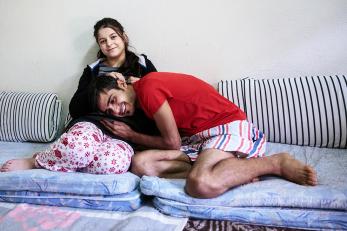
When Zaloukh married 27-year-old Markhan, war was only an inconvenience. But life in Aleppo quickly turned dangerous and the couple fled: first to another city in Syria, and then into Turkey, where they worked for three years to save enough to emigrate to Europe.
Still a newlywed, Zaloukh sold all her jewelry so they would have enough to make the journey. But Turkish smugglers took their money and abandoned them to the police before they ever hit the water. When they finally made the trip, only an old tire served as protection from the sea, and the borders into Europe were closed.
Today, Zaloukh is eight months pregnant in Greece. She wants to have the baby in a European country where he can get residency and the three of them can stay. But they have already been here four months, and she knows there is no immediate way to move forward. While they wait, a cash card from Mercy Corps helps them buy food.
“I left school in sixth grade, but I love to study,” Zaloukh says. Her dream now is to learn English, settle her family, and get back to work. “I’ll do anything,” she says.
Mohammad, 17
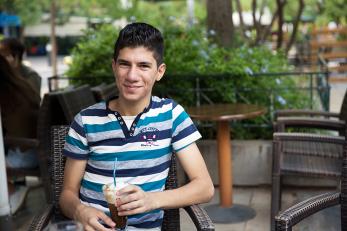
For Mohammad, life in Damascus was a ticking clock: his upcoming 18th birthday meant he would have to join the army. With conditions turning violent, his family made the decision to leave for safety and join his father and brother in Germany.
They paid $400 per person to be taken to the Turkish border, then $500 more to be taken across. To secure passage across the sea cost $650 more, which each of them paid for a spot on a small rubber boat they shared with 60 other people.
Mohammad loved physics and math back in Syria, and his father worked at a laboratory. Though he may be stuck in Greece, he’s determined to make the most of it: At a nearby youth center facilitated by Mercy Corps, Mohammad is learning German, Greek and English with students from Pakistan, Afghanistan, Somalia, Greece, Syria and Palestine.
He wants to go back to Syria one day. But he knows it may take the rest of his life.
“We saw death in each other’s eyes,” he says. “But it’s OK. We are fine now.”
Abdi, 17, and Yasin, 18
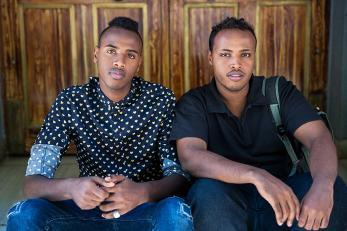
When Abdi and Yasin think about Somalia, they think of separation. Their family split years ago in a search for safety: first to Finland, then Greece, and finally Ethiopia, where the two brothers lived for five years. But after a decade apart, their mother couldn’t wait any longer and recently brought them to Greece.
Last year Abdi and Yasin traveled to Finland to reunite with other members of their family, but after six months they were sent back to Greece where they wait indefinitely. In the meantime, they are learning Greek and Greek culture at a Mercy Corps youth center, which provides resources such as language classes, art therapy and skills trainings.
“I’d like to continue to learn,” Yasin says. “I’d like to learn more, then I can work. I’d like to be a doctor or a policeman.”
Razia, 13, and Marzia, 15
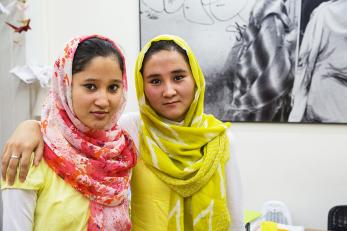
Razia and Marzia’s search for peace has been a constant journey. Originally from Afghanistan, their family fled from violence when the girls were young. First, they settled in Iran, but life there was too hard and they soon left again for Turkey.
Their brother made it alone to Sweden when he was 14, and studies there today. The family wants to join him, but for now they can’t: They arrived in Greece two days too late to go any further into Europe. They have been stuck here several months.
Life here is better than in Afghanistan — the people have made them feel welcome, Marzia says, and they are taking Greek classes at a Mercy Corps youth center. Marzia still dreams of being a doctor and Razia wants to be a writer.
But the camp they are in is not safe, Marzia says, and every day they miss their brother.
“We have family to go to in Sweden, but no one will help us,” she says. “After seven months I see that no one is working for us, no one will help us.”
Sonia, 12
Sonia remembers the day she received the call. Her friend from Afghanistan had made it to Germany and got in touch with the happy news: They were safe and settled, and Sonia’s family could join them.
The family sold everything they had and quickly left for Turkey. But there the journey ended: They were arrested eight times, each time with a 10-day waiting period before they could try again. By the time they made it to Greece, the borders were closed.
Sonia and her 15 family members have been in a refugee camp for four months. Though life has stopped, her dreams haven’t: She loves drawing and photography and is taking art classes at a Mercy Corps youth center.
Being around other young people has made her feel part of a community — even if what began as temporary has begun to feel more permanent.
“In [art class] we feel happy,” she says. “We talk to each other. During the class I feel good and I feel happy. I think it’s helpful for me.”
Saman, 19
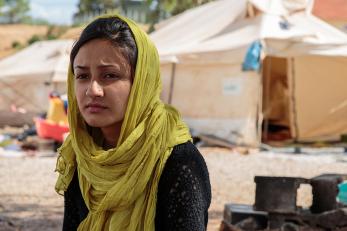
Since childhood, Saman has never let go of her dream to be a journalist. When she remembers life in Afghanistan, she thinks about high school and the joy she got from passing her exams. She would be in university there, one step closer to her future.
But when Saman’s father died of cancer, her mother’s job as a nurse wasn’t enough to keep the family stable. Then violence broke out near their home, and they had no choice but to flee.
They were arrested and sent back before they ever made it to shore. A second attempt proved successful, but the trip cost more than $5,000 each and wiped out their savings. Now they have no option but to wait.
Cash cards from Mercy Corps helps Saman and her mother buy food and other necessities. Though parts of Saman’s life are on hold, others are just beginning: She recently became engaged to a boy she met in the camp. Roeim is from Afghanistan, too, and traveled to Greece alone searching for a better life. Their families are happy and supportive, even though her mother is making them wait until the ceremony can be held outside a refugee camp.
“I hope to continue to study in university,” Saman says. “But here in Greece and in this camp, we don’t have a school or a way to study. It’s very difficult. So I hope to go to another country to start to go to university and pass the exams and study more.”
